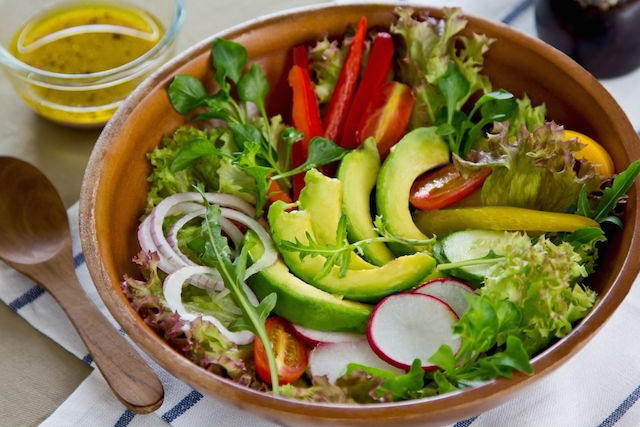The Mediterranean diet is based on two very simple principles: 1) eating fresh natural foods, such as olive oil, fruits, vegetables, cereals, milk, and cheese, and 2) avoiding industrially processed foods, such as frozen meals, fast food or meat products.
This type of diet is aimed at encouraging healthy eating rather than food restriction, and it works by providing the body with essential nutrients that help improve metabolism and encourage weight loss.
The Mediterranean diet is relatively easy to adhere to, as you do not need to reduce calorie intake drastically to lose weight.

Mediterranean diet meal plan
Here is an example of a 3-day Mediterranean diet meal plan:
This meal plan is best if you use fresh vegetables and fruits. It's also important you add 1 tablespoon of olive oil on your plate at lunch and dinner.
8 steps to getting started
There are 8 simple rules that can help anyone get started with and adhere to the Mediterranean diet:
1. Avoid processed foods
Your diet must be based on natural products, particularly plant-based foods, such as olive oil, brown rice or soy. In addition, you should avoid processed foods, such as frozen meals, fast food or meat products, and opt for homemade versions instead.
Eliminating processed foods will help decrease the accumulation of toxins inside the body, which can reduce inflammation, help with weight loss and treat fluid retention.
2. Eat fish and seafood 3 times a week
You should eat fish or seafood at least three times a week, as these are great sources for animal protein and healthy fats like omega-3. These are natural anti-inflammatories and can help to relieve pain in the joints, improve blood circulation and prevent heart disease.
3. Use olive oil regularly
Olive oil and other vegetable oils, such as canola and flaxseed oils, are rich in healthy fats that can help reduce high cholesterol and prevent cardiovascular disease.
To reap these benefits, you should get into the habit of adding olive oil or other plant-based oil to your food. You should aim for 2 tablespoon per day. Olive oil can also be used when cooking, frying or grilling.
4. Eat more whole-grain foods
The Mediterranean diet is rich in whole foods such as rice, whole-wheat flour, oats, and whole-wheat pasta, which are rich in vitamins and minerals. These foods improve body functions, fight constipation and decrease sugar absorption in the intestine.
Besides whole-grain foods, your diet should also include protein-rich vegetables such as beans, soy, chickpeas, pumpkin seeds and flaxseed, which also help strengthen muscles and improve metabolism.

5. Eat more fruits and leafy greens
Increasing your intake of fruits and leafy greens can provide you with fiber, vitamins and minerals that speed up metabolism and stimulate satiety, which helps with weight loss. You are advised to eat at least three different types of fruit a day. A good habit is to eat one piece of fruit after each meal.
6. Opt for skim milk and low-fat milk products
To improve your diet and decrease body fat, choose skim milk, eat natural yogurt and white cheeses, such as ricotta or cottage, and always choose skim or low-fat versions. If you feel like you need to sweeten natural yogurt, you can add a teaspoon of honey or jam.
7. Avoid eating red meat
Red meat should be limited to only once a week, so that there is room for meals with other good protein sources such as eggs, fish, and whole-grain foods, such as rice and beans, rice and lentils or rice and peas.
8. Only drink water
Water is the best fluid to quench thirst. If you don't like the flavor of plain water, you can flavor your water by adding lemon or ginger slices to a jar of water. You can also have one glass of wine, approx. 6 oz (180 ml) per day.
Health benefits
The Mediterranean diet is not used solely for weight loss. It's a healthy eating lifestyle that can have major health benefits such as:
- Reducing the risk of heart disease, cancer, diabetes, and degenerative diseases
- Preventing arteriosclerosis and clots
- Preventing cognitive decline and Alzheimer's
- Weight loss
To reap the most benefits from the Mediterranean diet, you should give preference to fresh, non-processed, seasonal, and local foods. You should also try to buy from small markets and fruit shops, rather than from big supermarkets.
